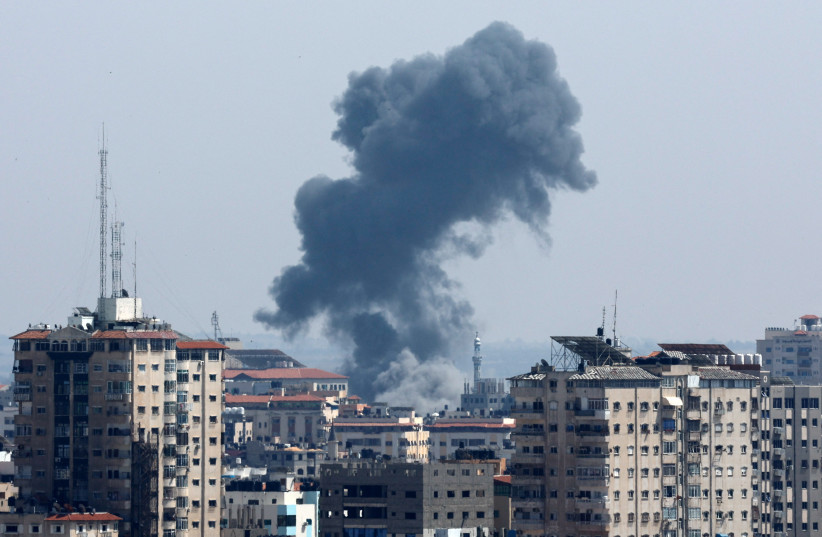The Palestinian Islamic Jihad had fired 803 rockets into Israel between Wednesday morning and 8 p.m. on Thursday evening, and the IDF had undertaken 191 airstrikes in Gaza in the same timeframe.
The IDF killed Islamic Jihad rocket commander Ali Ghali around 1:00 a.m. early Thursday, and his deputy, Ahmed Abu Daka, around 4:30 p.m. on Thursday.
As of Thursday night, Hamas continued to say it was running a joint operations room with Islamic Jihad, but IDF intelligence maintained its position that Hamas was overwhelmingly staying out of the fighting.
Although Islamic Jihad had not fired any rockets since 11:55 p.m. Wednesday night and fired only around 40 more rockets through most of Thursday, not long after Daka was killed, the terror group launched another barrage.
Earlier on Thursday afternoon, IDF chief spokesman Brig. Gen. Daniel Hagari had said that Iron Dome had shot down approximately 95% of rockets.

However, it was unclear if that success rate had fallen following Islamic Jihad’s large series of barrages Thursday night.
Regarding the earlier targeted killing of Ghali, it was carried out in cooperation between the Israel Air Force and the Shin Bet, which helped in locating Ghali, who was hiding in an apartment in Khan Yunis. Two additional Islamic Jihad terrorists were hiding with him in the apartment and were killed in the attack, according to the IDF.
The IDF described Ghali as responsible for aiming and firing rockets into Israel. He took part in the recent attacks during Operation Shield and Arrow, as well as past operations like Guardian of the Walls.
Ghali was a central figure in the organization and involved in its day-to-day management.
According to Palestinian media reports, at least three senior PIJ commanders were killed in this wave of targeted attacks. Dozens of additional people were injured in the attacks, according to the reports.
Abu Daqa, the second key terrorist killed on Thursday, was responsible for firing rockets into Israel, particularly into the Sderot area, and for the day-to-day management of the force.
According to the IDF, he had worked extensively to promote, plan and carry out attacks aimed at Israeli territory. In addition, he took part in firing rocket barrages into Israel during Operation Guardian of the Walls and Operation Breaking Dawn.
IDF Southern Command Maj. Gen. Eliezer Toledano said that the IDF could have killed Daka on Tuesday, but held off until he departed from a visit with his family so that innocent civilians would not be harmed.
The IDF also said that it had arrested around 25 Islamic Jihad terrorists across the West Bank to try to prevent them from escalating the already increased waves of terror against Israel from that area.
This latest round of conflict between Israel and Islamic Jihad had its roots in rockets that Israel faced on multiple fronts over the Passover holiday as well as over 100 rockets that the terror group fired at Israel over May 2-3.
Islamic Jihad said it fired the May 2-3 rockets as revenge for one of its top leaders dying from a hunger strike while in Israeli detention.
Although the IDF responded mildly to Islamic Jihad’s rocket attacks back on May 2-3, Prime Minister Benjamin Netanyahu and Defense Minister Yoav Gallant already on May 2 ordered Israel’s security forces to prepare a much more substantial attack for the near future.
That attack was rolled out overnight between Monday and Tuesday with the killing of three top Islamic Jihad officials.
The Jerusalem Post learned on Thursday that those original officials who were killed were even higher up in the organization than the officials killed on Thursday.
